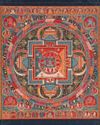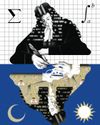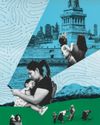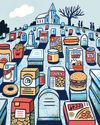
The political deployment of imagery from Margaret Atwood’s novel “The Handmaid’s Tale” began in Texas, in the spring of 2017, at a protest against the state’s ongoing campaign to restrict abortion rights. The TV adaptation of the book would soon begin streaming, on Hulu. The show stars Elisabeth Moss as the novel’s narrator and protagonist, Offred, a woman stripped of her job, her family, and her name in a nearfuture American theocracy called Gilead. Offred is a Handmaid, forced to live as a breeding concubine; each month, she is ceremonially raped by her Commander, a man of high status, in the interest of rebuilding a population that has dwindled owing to secular immorality, environmental toxicity, and superS.T.D.s. Like all Handmaids, she wears a scarlet dress, a long cloak, and a faceobscuring white bonnet, a uniform that Atwood based, in part, on the woman on the label of Old Dutch Cleanser, an image that had scared her as a child.
Women wore this uniform to the protest in Texas, and they have since worn it to protests in England, Ireland, Argentina, Croatia, and elsewhere. When “The Handmaid’s Tale” was published, in 1985, some reviewers found Atwood’s dystopia to be poetically rich but implausible. Three decades later, the book is most often described with reference to its timeliness. The current President has bragged about grabbing women “by the pussy,” and the VicePresident is a man who, as governor of Indiana, signed a law that required fetal remains of miscarriages and abortions, at any stage of pregnancy, to be cremated or buried. This year, half a dozen states have passed legislation banning abortion after around six weeks; Alabama passed a law that would ban abortion in nearly all circumstances, including cases involving rape or incest. (All these laws have yet to take effect.)
Esta historia es de la edición September 16, 2019 de The New Yorker.
Comience su prueba gratuita de Magzter GOLD de 7 días para acceder a miles de historias premium seleccionadas y a más de 9,000 revistas y periódicos.
Ya eres suscriptor ? Conectar
Esta historia es de la edición September 16, 2019 de The New Yorker.
Comience su prueba gratuita de Magzter GOLD de 7 días para acceder a miles de historias premium seleccionadas y a más de 9,000 revistas y periódicos.
Ya eres suscriptor? Conectar

MEAN TIME
“Hard Truths.”

ENLIGHTEN ME
The secret beauty of mandalas.

THE BEST OF THEM
His was a genius for the ages. Will Gottfried Leibniz ever get his due?

DEATH CULT
Yukio Mishima’ tortured obsessions were his making—and his unmaking.

Prophecy
The night of Dev’s twenty-second birthday, he was invited to sit with the elders after dinner.

A TALE OF TWO DISTRICTS
Lauren Boebert and Colorado’s red-blue divide.

THE TIKTOK TRAIL
Andean migrants draw others to the U.S. with videos depicting themselves as living the American Dream.

LOVE AND THEFT
Did a best-selling romantasy novelist steal another writer's story?

OUR NEW TWO-FACTOR AUTHENTICATION SYSTEM
Our two-factor authentication system is expanding because text messages and e-mailed codes are becoming less secure. Also, we’re committed to making sure your log-in process is more of a hassle than it needs to be.

STILL PROCESSING
Why is the American diet so deadly?